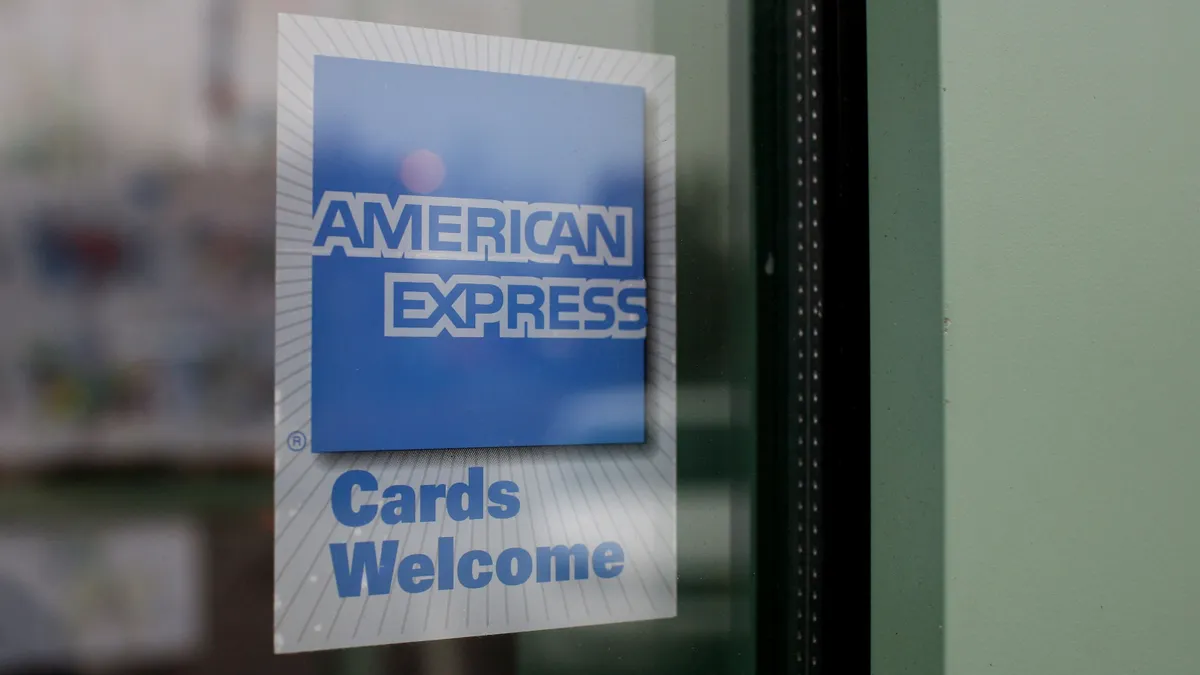American Express is moving deeper into the banking space with the launch of a business checking account, an offering that leverages the automated lending technology of Kabbage, the fintech it purchased last year.
The no-fee Kabbage Checking account is meant to help small businesses grow, and features an annual percentage yield (APY) of 1.1% on balances up to $100,000.
The checking account, which is offered in partnership with Green Dot, offers small-business owners access to free in-network ATMs, mobile check deposit, a debit card and bill pay. Users can also make in-person cash deposits at 90,000 participating retailers nationwide.
American Express said the account is just one of many products it’s offering that falls in line with its goal to become a "digital one-stop shop" for the small-business banking sector, a space that has long been dominated by traditional banks and a growing number of fintechs.
"We have great cards, we’re an industry leader for small-business cards," Anna Marrs, president of global commercial services at American Express, said at a conference last month, according to CNBC. "It’s when you try to go beyond that that we don’t always have the skills in-house, we don’t always have the products on the shelf."
American Express reportedly paid $850 million last August for Atlanta-based Kabbage’s suite of fintech products, data platform and its internet protocol for small businesses.
Kabbage, which had pivoted its business model to focus on Paycheck Protection Program (PPP) lending amid the start of the pandemic last year, was a prolific PPP lender, making 300,000 of the loans worth $7 billion over the course of its participation in the program.
The fintech’s PPP portfolio, however, was not purchased by American Express, and operates as a separate entity called K Servicing. The Justice Department's civil division is examining whether Kabbage miscalculated how much PPP aid borrowers were entitled to, sources told Reuters last month.
Kabbage’s co-founder, Kathryn Petralia, said the goal for the checking account is to provide small businesses with a level of service that isn’t being offered by most traditional institutions. Kabbage rolled out a soft launch of the checking account product last summer, before American Express acquired it.
"There are 30 million small businesses in the U.S. and 90% of them have fewer than 20 employees and 80% have fewer than 10 employees," she said. "These businesses interact differently with their bank than a large corporation or even a corporation that has 100 employees. It's just a very different type of relationship. One of the challenges that these small businesses and startups have always had is that traditional institutions don't necessarily take them seriously until they get bigger."
Small businesses are looking for an institution that will "meet them where they are" by offering them the same basic services that consumers get, she added.
"A pretty large percentage of businesses fail in the first couple years of their life," Petralia said, adding Kabbage’s technology sets it apart from traditional banks that may lack the automation, tools or data that make it cost effective to serve small business. "That's something Kabbage has spent the last 12 years doing."
Following its acquisition of Kabbage, American Express has also started offering Kabbage Funding to its small-business customers. The credit card company said it has already made the product, which offers small businesses flexible lines of credit between $1,000 and $150,000, available to "millions of existing customers," and plans to make it more broadly available this year.














